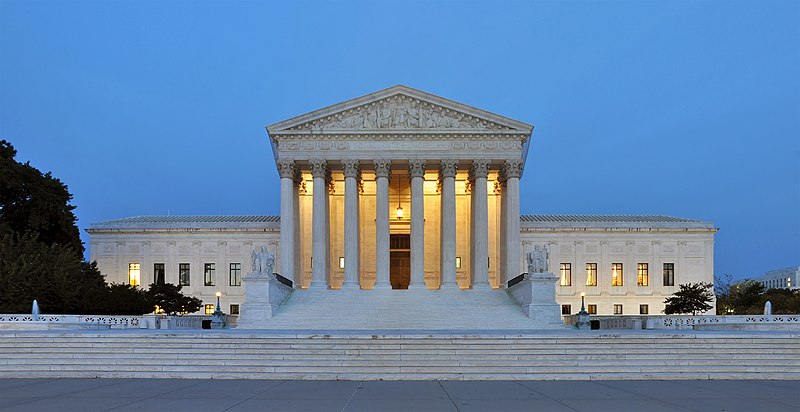In The Line, Meaghie Champion outlines the awkward position the Oneida First Nation found itself in after their case made it to the US Supreme Court:

Panorama of the west facade of United States Supreme Court Building at dusk in Washington, D.C., 10 October, 2011.
Photo by Joe Ravi via Wikimedia Commons.
In 2005, in the case of the City of Sherrill V. Oneida Indian Nation of N.Y., the U.S. Supreme Court ruled against the Oneidas, after the nation had attempted to assert sovereignty in traditional land they had to re-purchase after it had been illegally acquired.
Writing the majority position was the late liberal figurehead now being lionized in U.S. media — Ruth Bader Ginsburg.
Granted, she fought for women’s rights and accomplished a lot. She was a law school professor and a judge. She was one of the leaders of the American Civil Liberties Union. She was the second woman to ever serve on the United States Supreme Court. She was influential in a lot of cases on the Supreme Court, including a labour law case that inspired a law to be passed, and an environmental case that set new standards for who could be heard in court on environmental issues. Since her recent death, the news coverage has been singing her praises like hagiography.
But study history and you will find lots of villains, and no saints. Many First Nations people in North America look on Ginsburg’s reification with a much more skeptical eye.
Meanwhile, the sovereignty of many Indigenous nations in B.C. has never been extinguished. Many First Nations here are being corralled into signing treaties that give up lands, rights and sovereignty. They may look to the Oneida as a cautionary tale. When it comes to sovereignty, you must use it or lose it. Don’t look to courts to give it back later. Not even when you have a social justice saint for a judge.
Ginsburg ruled that Indian land in central New York acquired in violation of U.S. federal law, a treaty, and the U.S. Constitution, could not be reintegrated into the ancestral lands of the Oneida Indian Nation — that the Oneidas would be required to pay property taxes to the local government of the City of Sherill. That is, unless the Oneidas sacrificed that land and allowed the federal government to administer it as a trust.
Justice Ginsburg wrote that 200 years had passed since the initial illegal acquisition, the land had passed hands between jurisdictions multiple times over the period, and that the Oneida had just waited too long. (Even though the U.S. Supreme Court acknowledged in 2005 that there was no specific time limit on this kind of case.) She claimed in her opinion that it would just be “unfair” to the non-natives in this case. If the Oneida had sued in court sooner, then it would have been different.
In the long and fraught web of relationships between First Nations and the United States government, it’s hard to pick a time before the late 20th century or early 21st where a First Nations case might be given full and fair hearing by any federal court, which shows Ginsburg’s opinion to be … lacking in historical sensitivity.



